What is a Puppy Mill?
And Other Frequently Asked Questions
PLEASE NOTE: Dog Garden Flags are currently unavailable. Please check back later. Thanks for your interest.
What is a puppy mill? A puppy mill is a place of endless confinement and egregious living conditions where dogs are used as breeding machines as part of their lease to remain alive.
Degenerate opportunists hold our most beloved souls hostage in filthy, rusted cages. The dogs eat, sleep and live in these unfathomable living conditions every single day of their lives.
The helpless breeding dogs go without medical treatment when they're sick. They go without blankets when they're cold. They don't get exercise. They are not loved.
Meanwhile, the deadbeats who run these places get rich from the suffering of the animals because it's easy to lure in clueless shoppers with irresistible lies, like adorable puppies in a window and fancy websites. Don't allow yourself to be duped!
What is a puppy mill if you're shopping online? If you're shopping for a dog online, a puppy mill is like a dating-site-catfish. She's enticing you with adorable pictures of puppies taken in front of a tidy backdrop. Her website uses words like "family raised" and makes it sound believable, but she's using that backdrop as a filter to mask hideous neglect, disease, filth, horrendous cruelty, illness and greed.
If you're shopping for a dog in a pet store, the question, 'what is a puppy mill?' becomes a lot more manufactured and convoluted. Imagine the same conditions as above on a bigger, more commercial scale where the facade is a sparkling Disney castle, but inside is a dismal prison cell made of rusty, shit-caked wire where sub-human individuals are inflicting torture on the most undeserving victims.
Puppy Mills and Pet Stores
How can we love dogs, but still doom them to a life of misery to satisfy our desire to attain one?
When it comes to America's love for dogs, it's hard to deny the gross disassociation with our love and desire for a puppy, and our willingness to look the other way on where the puppy came from. If you happen to be in a pet store when you ponder that question, the answer is ALWAYS a puppy mill.
Puppies that are bound for pet stores are snatched from their mothers around 6-8 weeks of age.
For the mother, having her puppies taken too soon is both depressing and a blessing. She has been locked up with them for their entire 6-8 weeks never getting a break from their constant crying and nursing. Her teats are swollen, painful, infected and if she's lucky they're free from mammary tumors that so many female dogs rescued from puppy mills are affected with.
If the puppies are destined for a pet store like Petland, they are picked up by puppy brokers (the shameless middle-men), driven across state or across the country, sometimes hundreds of miles in crates in the back of sweltering trailers, many are extremely unwell when they arrive, but some don't make it at all.
Operating a Puppy Mill is Not Illegal
You might be thinking that torture on this scale is somehow illegal, but you'd be wrong.
Unfortunately it's legal to keep a dog in a tiny crate for it's entire life with only inches of room to spare and there are at least 10,000 puppy mills across the United States of America churning out 2.6 million puppies per year.
In fact, these operations are so large scale, that the government decided they needed a cut of the profits. They require anyone with 5 or more breeding bitches to acquire a USDA license, which is a license to factory farm dogs, with little oversight, in these same inhumane conditions, as long as they pay their license and renewal fees. Many of the pictures included on this page are from puppy mills with USDA licenses.
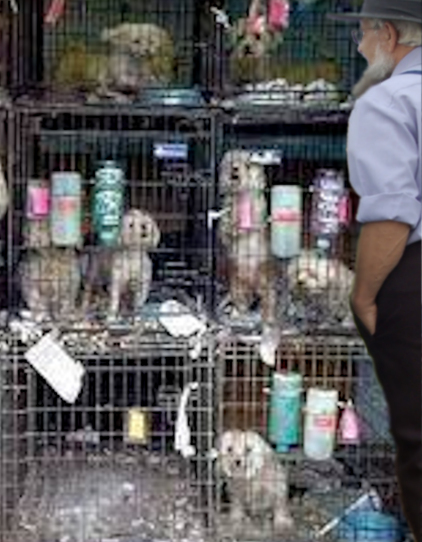 Dog auctions, where puppy mill operators, many of which are Amish, sell their unsold puppies and unwanted breeding stock to other breeders.
Dog auctions, where puppy mill operators, many of which are Amish, sell their unsold puppies and unwanted breeding stock to other breeders.In the land of milk and honey where everything that can turn a profit is industrialized, even at the expense of one of our most celebrated and gentle domestic creatures, these foul individuals operate in secret instead of getting jobs.
Amish aren't the only offenders when it comes to puppy mills, but the general lack of empathy toward animal-kind is common amongst them.
I will not support the Amish in any capacity. I don't buy their baked goods or employ them for any construction needs. In my years of living around them and witnessing firsthand their treatment of horses and livestock, not to mention all the puppy mills in my area of Ohio, I will never support them again.
Their lack of sanitary indoor plumbing and hot running water makes their pies a lot less appetizing in my opinion anyway. Food for thought...
What is a Puppy Mill Like for Female Dogs?
Female dogs in puppy mills outnumber the males, 10-fold for obvious reasons.
The sole objective of a puppy mill is to maximize profit, so female dogs are bred during every heat cycle. As you might imagine this takes it's toll and most can only whelp puppies for around 5 years before their bodies are entirely used up.
If she's a long haired dog like a Yorkie or a poodle, she is matted. Her matted fur has trapped urine and excrement to her skin and has caused burns. She has fleas and other parasites and her nails are long, curled under and painful. She's never slept on a warm lap or felt the grass beneath her feet. She has lived in a prison without kindness in an uncomfortable wire crate and that is the only life she will know, until her untimely death.

Puppy mill dogs are disposable. When a breeding mother is sick, she
is replaced, often with 1 or 2 or her puppies. On very rare occasions,
dogs are rescued, but the vast majority will be killed when their life
of servitude is over.
Sadly, the breeding mothers who only live 5-6 years are among the lucky ones.
This precious little Yorkie suffered despicable injuries caused by a crude method of debarking. Puppy mills debark dogs to keep them quiet. The Amish are well-known for this brutality against their breeding dogs.
Several of this poor dog's teeth were missing and her jaw was badly injured. She would have lived the rest of her life in pain... and even in her condition would have been forced to give birth to several more litters if she had not been rescued.
Thanks to the work of a caring person, She is one of the few lucky dogs to have escaped her cage, but there are thousands just like her with very little hope of ever making it out alive.
The same as you would never treat an animal like this, you should NEVER buy a puppy from a pet store. A responsible breeder would NEVER sell puppies to a pet store and you should NEVER believe otherwise.
Pet stores will tell you that their dogs come from "Local Breeders" because that's what they're told to say, but guess what, every puppy mill in the world is "local" to someone.
 Another lucky dog saved from a puppy mill. Even with a broken leg, she was forced to give birth and nurse puppies. Broken legs are a common sight in puppy mills that use wire cages.
Another lucky dog saved from a puppy mill. Even with a broken leg, she was forced to give birth and nurse puppies. Broken legs are a common sight in puppy mills that use wire cages.What is a Puppy Mill Versus Responsible Dog Breeder
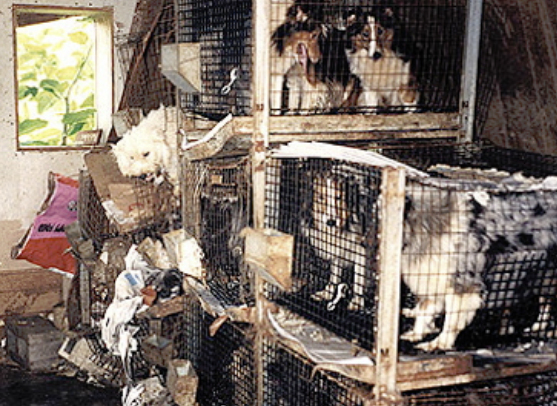 This is their entire life. They are not pets. They don't get walked or sleep in nice comfortable beds. They're prisoners here until they can no longer reproduce. That is when most are killed.
This is their entire life. They are not pets. They don't get walked or sleep in nice comfortable beds. They're prisoners here until they can no longer reproduce. That is when most are killed. There are several ways to know if you're dealing with a puppy mill versus a responsible breeder. If you're standing in a pet store that sells dogs, they 100% came from a puppy mill.
If you happen to be scouring the internet when you find a potential breeder online, there's a pretty good chance it's a puppy mill.
They'll likely use words like, "family raised", "papers", "health guarantee", "AKC", but don't allow yourself to be duped!
If you choose to give them a call, don't feel apprehensive in the least about asking the following questions in the section below. A responsible breeder will know why you're asking and will be glad you're doing your due diligence.
If on the other hand, the person seems annoyed or reluctant to divulge information... You still should not feel bad. You're likely dealing with a puppy mill or puppy broker and they deserve to have pressure put on them. They are the bottom feeders of society along with anyone else who could hurt an animal, a child or intentionally inflict harm on another.
How to Spot a Puppy Mill - Foolproof
Here are a few red flags along with questions you could pose to help determine if you're dealing with a puppy mill: Try to sound laudatory in your questioning. Sound curious instead of accusatory. Keep in mind that they are likely well versed in what to say to trick you. You will have to listen carefully and follow-up on their responses.
- A website that claims to raise their dogs in the home, but lists more than two different breeds of dogs on the site. There's no need to look further, this is a puppy mill. Don't be fooled by cute pictures. Many puppy mills are known to re-use the same pictures over and over again for years.
- Ask them if they sell to pet stores. No responsible dog breeder would sell their puppies so anonymously out of fear they could potentially end up in a puppy mill.
- Ask for the parent dog's names. Use your judgement and listen for long pauses, stuttering and obvious lies. If they have trouble coming up with a name for the mother or father dog, it's a puppy mill. If you ARE able to get the names of parent dogs, get the first and last name of the person you're speaking with AND their address. Then...
- Ask for the vet's name or vet clinic where the parent dogs are treated and given their shots. Then follow-up with the vet. (The vet techs on the phone may not give you a lot of details, but they will be able to tell you if they care for the dogs you're inquiring about and might know whether it's a puppy mill).
- Google the breeder's name and hometown to find their residential address, make sure it's the same as the address they gave above. Ask to meet the puppy and parent dogs at their residence. This is not an unreasonable request. Requesting to see parent dogs IN PERSON is a reasonable request when you're paying hundreds or thousands for a puppy. A good breeder will be more than proud to introduce the breeding parents to you and will not feel the need to do so in a parking lot.
- If they agree to let you meet the parent dogs in their home, touch them. Do they seem scared and confused? Do they have a strong kennel odor? A strong kennel odor is a clear indication that the dogs don't actually live inside the house.
- If you ask to meet the puppy before purchase, but they will only meet you in parking lots, it's a puppy mill. Period.
- If you're standing in a petstore that sells puppies, these dogs came from puppy mills. (On the other hand, if you're in Petsmart, please support them. If you see a dog in their store, it's a rescue dog being hosted in an attempt to find a forever home).
- If the breeder is willing to ship the dog to you without meeting in person, it's a puppy mill.
- Ask how many puppies are for sale of any given breed. If it's more than a typical litter of puppies for the breed, that's an indication that puppies are from separate litters, it's most likely a puppy mill.
- Ask how often she has your chosen breed of puppies for sale, then do the math. If she'll have puppies again within a few months, even if it's from another female, it's likely a puppy mill. If the same dog will have another litter within 6-8 months, it's definitely a puppy mill.
- Ask for proof of health screenings. A health 'guarantee' is not the same thing. Most will only guarantee you a new puppy if yours should become sick. This kind of "health guarantee" is another red flag that the breeder is operating a puppy mill. A health guarantee from a legitimate breeder is paperwork showing that her dogs have been genetically tested. She will offer a refund in writing (not a new puppy) if the puppy becomes sick.
- Anyone who's not forthcoming or seems annoyed by these questions is likely running a puppy mill. Puppy brokers are also well-known to have websites listing multiples puppy breeds. Puppy brokers are the middle men between puppy mills and pet stores. They're equally as deplorable as their counterparts.
- They claim to be a rescue, but only have puppies that need "adopted" for high prices and they don't require a spay or neuter contract.
- A sign along the road for expensive puppies is likely a puppy mill or backyard breeder. Backyard breeders and puppy mills might have a sign along the road, but a responsible breeder never would. It's common in Amish country to see signs for puppies along the road.
- If the breeder is USDA licensed, it's a puppy mill. A USDA license is a license to factory farm dogs, which is a clear indication of a puppy mill. In most states, a USDA license is required to sell dogs to a pet store. A USDA license is required for anyone with 5 breeding bitches or more. If a person has 5 breeding bitches, these dogs are not pets, they're slaves and there is no chance they live inside of a loving and caring home.
As a side note, Having AKC or CKC papers or any other papers related to registering puppies means nothing. Almost all puppy mills register with AKC. And now AKC has partnered with Petland. Petland has been the subject of MANY MANY puppy mill mistreatment stories. The AKC regularly uses it's large pocketbook to actually fight laws meant to protect the dogs in puppy mills.
Please report the operation. Puppy mills are not illegal, but breeding operations are supposed to be licensed by the USDA. Report any suspected puppy mill to your local animal control agency, sheriff's office or humane society. The Humane Society of the United States also has a puppy mill tip line, 1-877-MILL-TIP.
Another phone call you could make would be to a rescue group in the area of the suspected puppy mill. Do an internet search for (your breed) + (location) + rescue group. Rescue groups know from experience how to handle puppy mills. They'll know what to say to save parent dogs whose breeding days are over, to increase the odds of the puppy mill surrendering the dog instead of killing it.
Reporting these operations is important, both locally and federally. Even though oversight is still severely lacking and those with lengthy lists of egregious violations with the USDA (see examples below) are not held accountable, some oversight is better than no oversight. Your tip might be the one that finally gets the breeding dogs rescued.
Be diligent and studious in your search for a puppy. Being intentionally misled by a puppy mill is bad enough, but there are a lot of other puppy scams across the internet. Currently, across facebook pages and fake websites, people are taking deposits for dogs they don't actually own using stolen photos from the internet. If you feel like you've been the victim of one of these puppy scams, contact your state's attorney general office.
Meeting the puppy and the parent dogs at the home of the breeder is a great way not to be duped by either of these scams. Insist on paying the deposit in person and meeting the parent dogs in person at their residence to avoid being scammed out of your money... and scammed out of your moral conviction to avoid puppy mills.
USDA Licensed Dog Farms and Breeders and Why You Should Avoid Them.
A USDA license is a license to factory farm dogs, which is a clear indication of a puppy mill. Many of the USDA licensed puppy mills are among the worst of the worst.
Here is one example of many; a licensed USDA puppy farm was found in violation of several laws pertaining to the AWA (animal welfare act). It found the breeder had twisted the tails off of puppies, an inhumane method of tail-docking. It also found a new litter of Weimaraner puppies who were living outdoors, were severely underweight, with protruding bones and infested with fleas and ticks. One was unable to stand.
The USDA agent filed the report and visited 3 more times over the next 5 years and found 20 more equally appalling violations. The breeders license was still renewed for another year each time. And to this day, this particular breeder is still USDA licensed to continue his sick breeding operation in the state of Missouri.
The problem is that the USDA is very business-friendly (I use the term "business" very loosely). They push a lot of paperwork and charge their fee, but it's very rare for them to actually pull a breeder's license.
A puppy manufacturing facility is NOT a legitimate business. Penning dogs up for their entire lives is a harsh act of cruelty, in and of itself. It's damaging both mentally and physically. Any industry that profits from prolonged torture and misery such as this should have their shame brought to the forefront, instead of being allowed to operate in secret.
Dogs are companion animals. They were domesticated and bred to perform specific actions for human assistance. From herding sheep to seeing eye dogs, and mouse chasers to hunting dogs, it's in their DNA to be by our loyal assistants.
Dogs don't belong in cages. And while I'm on the subject, they don't belong tied to trees in the backyard either.
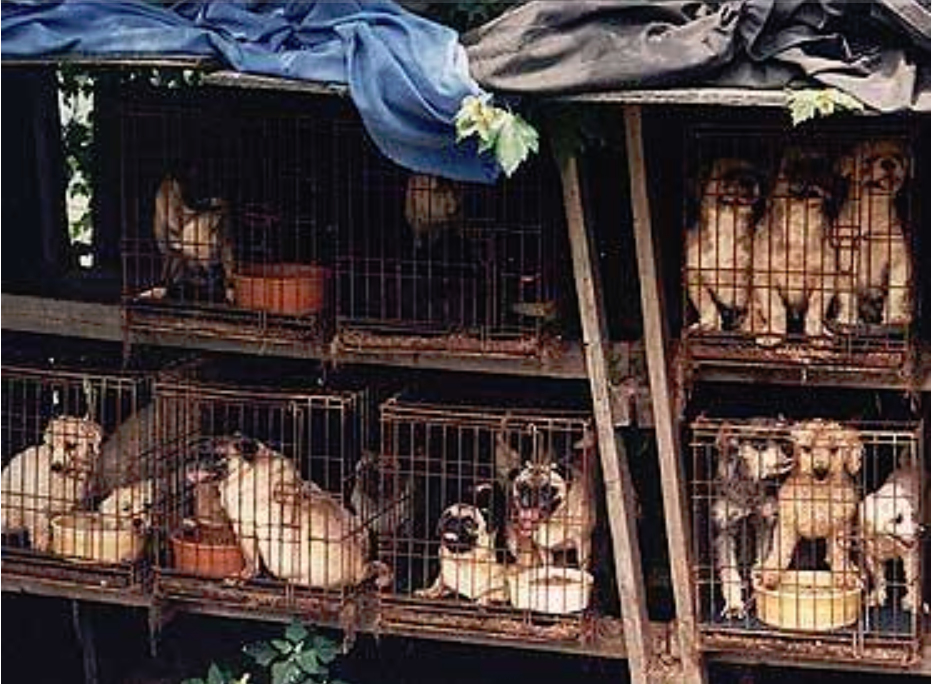 Pugs won't live long in these conditions. Their pushed in faces make it harder for them to breathe, even in normal conditions. The temperatures and putrid smell of waste will eventually lead to a respiratory distress. They'll be replaced by one or two of their puppies when they die.
Pugs won't live long in these conditions. Their pushed in faces make it harder for them to breathe, even in normal conditions. The temperatures and putrid smell of waste will eventually lead to a respiratory distress. They'll be replaced by one or two of their puppies when they die.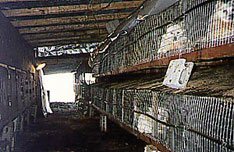 Row after row of cages lined with Shiba Inu breeding dogs.
Row after row of cages lined with Shiba Inu breeding dogs.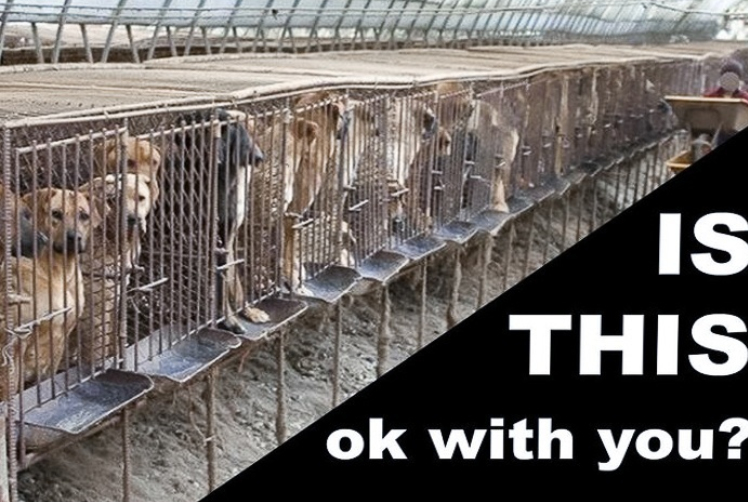 Notice the person pushing the wheelbarrow is wearing a mask to filter out some of the ammonia smell from urine and feces. These dogs are forced to eat, sleep and live here 24 hours a day, until they're killed when they can no longer reproduce.
Notice the person pushing the wheelbarrow is wearing a mask to filter out some of the ammonia smell from urine and feces. These dogs are forced to eat, sleep and live here 24 hours a day, until they're killed when they can no longer reproduce.Backyard Breeders VS Puppy Mills
How do backyard breeders differ from puppy mills?
Backyard breeders often start out by breeding their pets, but are ignorant of breeding for temperament, breed standard, health, genetic defects, etc. They're strictly breeding for the money or some other idiotic reason... like wanting their children to witness birth.
A backyard breeder could be someone you work with who has puppies for sale or a neighbor who accidentally (or on purpose) allowed her Westie to get pregnant, etc.
The major difference is the number of breeding dogs and where and how they're kept.
It's a very slippery slope from a backyard breeder to a puppy mill. All too often, a backyard breeder gets in over her head and unwittingly turns a tiny breeding operation into a puppy mill. So what might have started with an accidental pregnancy turns into a full scale puppy mill driven by the desire to profit from the puppies.
How to Know if a Breeder is Reputable
How will you know if a breeder is reputable? Below are the practices and traits of a creditable and trustworthy breeder.
- She will happily show you around her home and be happy to introduce you to the breeding parents of the puppy you're purchasing.
- She has papers to show that her dogs have been tested for possible genetic health issues and she will offer you a "real" health guarantee for your puppy, not just the promise of another potentially sick dog.
- She only mates her dogs when it will enhance the breed. She may only have puppies available every other year or so and she will gladly be there after the sale if you should have questions about anything related to the precious puppy she's placed in your hands.
- A reputable breeder will most likely insist on a no-breeding policy with restricted registration papers so the dog cannot be bred or she will insist on an iron-clad spay/neuter contract, so that the puppy she brought into the world will not become victim to the horror of life as a puppy mill breeding dog.
-
She is an enthusiast of the breed and she will be involved in breed rescue groups, dog shows, field trials, obedience or agility training, or some sort of group or club involving her dogs. AKC and other puppy registries not included.
- She assumes a lifetime responsibility for the puppies she produces and will insist on taking back the dog if a time ever comes that you can no longer care for it. This will be part of her contract.
- A reputable breeder has extensive knowledge of the breed of dog you're purchasing. She's an enthusiast of one or two dog breeds at the most and will be able to answer questions related to energy level, temperament, exercise requirements, grooming requirements, special needs, suitability with children, etc.
- She has already begun socializing the puppies with lots of human interaction, fun and toys because she knows early socialization is extremely important.
- She is familiar with the puppy's individual personality.
- She has started the puppies on a good quality food and will make sure you're well informed of feeding routines and diet to help you better acclimate the puppy to his new home.
- A reputable breeder cares about each and every one of the puppies she produces and she makes it her business to know the type of person you are and the home the puppy will go to. She would never release her puppies to a pet store. She will likely have just as many questions for you as you have for her.
- AND FINALLY... A reputable breeder does not use marketing terms such as "tea-cup"! There is no such thing as a "Tea-Cup" dog, Yorkie, Maltese or otherwise. Careless breeders invent these terms as marketing ploys in order to sell tiny dogs for higher prices. A good breeder does not purposely produce dogs below breed standard. She may occasionally have one that's smaller, but she will be VERY assiduous on where she'll place this fragile puppy.
Click here to learn everything there is to know about teacup dogs.
How to Put an End to Puppy Mills
What can one person do to put an end to puppy mills?
One person can do so much...
- Never buy a puppy from a pet store.
- Don't be tricked by words like "local breeder", "papers", "health guarantee" or "Family raised" (if it were true, they wouldn't need to make a proclamation).
- Don't support the stores that sell puppies. Don't buy dog food from them and don't use their grooming services, etc.
- If you're on facebook, look for rescue groups near you. Many times they are staging protests or asking for public help in another capacity.
- Adopt your next dog or choose a reputable breeder using the guidelines listed above.
- Animal cruelty needs to be a felony everywhere, not a misdemeanor for those (like puppy millers) who repeatedly harm animals. To help make animal cruelty a felony in your state, contact your state Representatives by email to express your concern.
- Contact your state representatives and demand puppy mill reform laws. In May of 2022, New York passed a bill to help end of the scourge of greed and animal cruelty within the state by outlawing the sale of puppies in pet stores. Ohio passed a law that puppy millers (only those who sell to pet stores) could no longer keep dogs in wire crates and increased the size requirement of the individual kennels, which is a smaller step forward compared to New York, but it was thanks to people like just like us who demand higher standards from our state representatives.
- Interested in doing something more hands-on? Hang fliers in businesses around your area, hand them out or put them up near pet stores that sell puppies.
- Here is a flier you can hang in businesses around your area. Hang them on grocery store bulletin boards, in laundry mats, veterinary offices and anywhere else you think they'll be noticed.
- Make a poster-board sign and stage your own protest in front of a pet store that sells puppies.
- Get children involved. Teach them young.
- Get the community involved by creating a facebook post. Feel free to use any of our pictures in your efforts.
If you're considering buying a puppy online, from a newspaper ad or at a pet store, there is a 99.9% chance that you're about to become a part of the problem. Please watch this video and join us in the fight against the torture of animals in puppy mills
.
Warning: If the following video is too disturbing to watch, kindly "think of the suffering of which you spare yourself the sight". (Albert Schweitzer)


Learn more about me, my art, the mission of this site and Rescue Dogs Are Better here.
We also welcome you to contact us if you have any questions about anything you saw or read on this site.
Check out www.stoppuppymills.org to learn more about putting an end to puppy mills.
While You're Here...
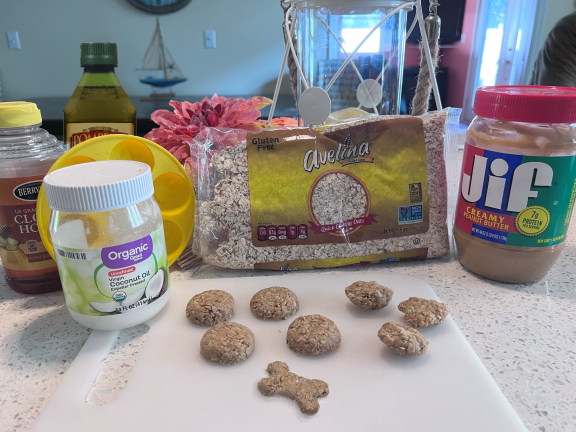
This delicious, no-bake dog treat recipe is likely healthier than store bought, uses ingredients you probably already have at home, and you can make it gluten free!
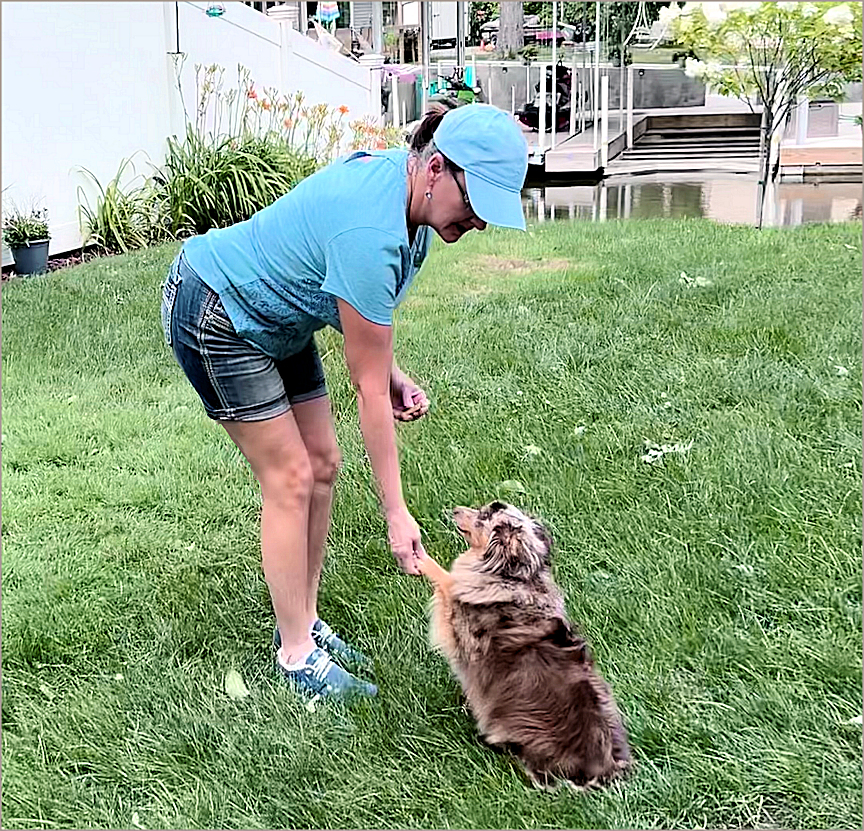
Nothing is more important to the relationship your share with your dog than training. Learn these easy training techniques and some cool tricks, too!
Learn how to make this super cute, no-sew dog bed with the materials you already have at home. Better than store bought!
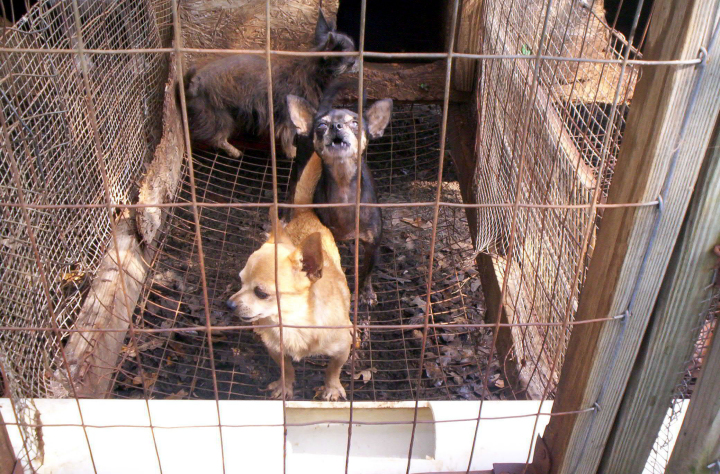
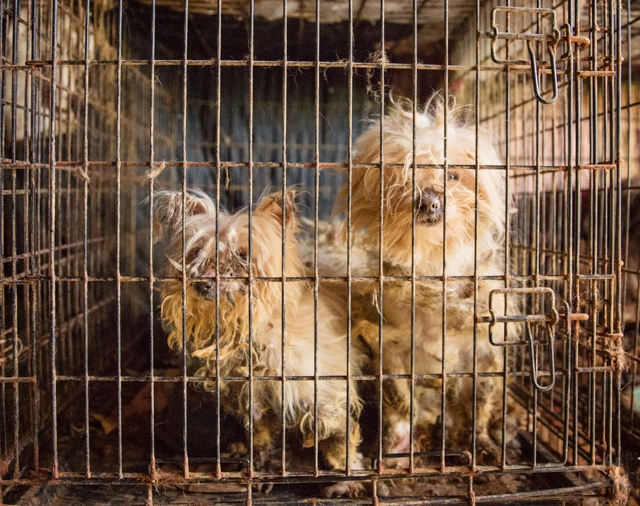

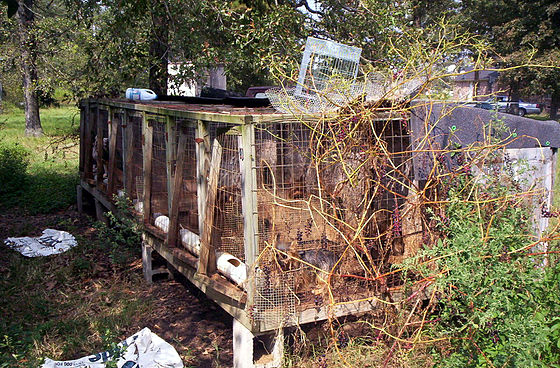


New! Comments
Leave us a comment if you have something you'd like to share or add to what you just read here. Or contact us with questions or comments.